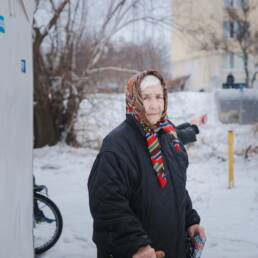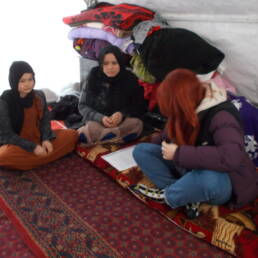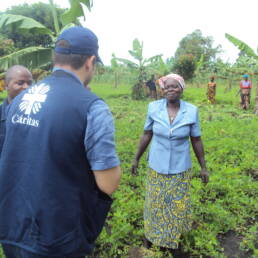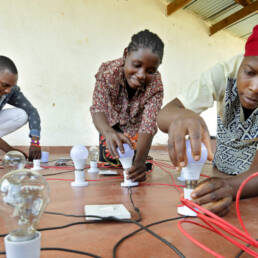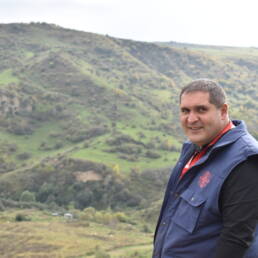Author
Fionnuala Flynn
Humanitarian Advocacy Officer
Caritas Europa
Additional information?
Phone number?
fflynn@caritas.eu
After one month of war in Ukraine, the importance of local actors in humanitarian response is clearer than ever
Thursday 24 March marked one month since the beginning of the current Russian invasion in Ukraine and subsequent war. Since then, over 3.5 million people have fled – half of them children – while there have been tens of thousands of civilian and military casualties. 12 million are expected to need humanitarian assistance over the coming months.
The speed at which the invasion took place, and the ensuing mass movement of people, has caused a shock not seen in decades on the European continent. The surrounding countries of Poland, Romania, Moldova and Hungary have collectively received over 3 million people in less than four weeks.
While the horror and brutality of the conflict continues to be widely documented, the humanitarian response has been a force of equal strength. Hundreds of images and videos have been shared of the kindness being shown to refugees at border crossings, while the desire of the European public to assist has been almost unprecedented. Across the EU, with the activation of the Temporary Protection Directive, Member States are preparing to receive those who flee.
Local organisations at the core of the response
At the core of the response – as with all humanitarian emergencies – are local organisations and communities. Up until last month, the international presence in Ukraine has largely been confined to the eastern Donbas region, in response to the ongoing conflict since 2014. The recent invasion however has forced them to regroup and enlarge exponentially in cities and areas with which they are unfamiliar, and in an extremely hostile environment, both in terms of logistics and safety.
In an environment where the presence of international relief agencies is traditionally sparse, small groups and organisations have mobilised and scaled up at incredible speeds to meet the needs of those both within Ukraine and those who have fled. While local actors are always the first to respond, the context in Ukraine has demonstrated this in much clearer terms.
Initially, it was local aid groups and civilian volunteers who fronted the humanitarian response. In cities such as Kyiv and Mariupol, both direct targets of hostilities, local groups and volunteers have provided shelter, food, water and basic medical supplies, while in the western city of Lviv, yet to be targeted, millions of displaced people have been supported as they move towards the borders with other European countries, or seek safety with family and friends.
In the surrounding countries, the mobilisation of local response has been no less inspiring. Where aid agencies were a relatively rare sight in pre-February western Ukraine, they were arguably even more rare in countries such as Poland, Moldova, Romania, Slovakia and Hungary, all shouldering the vast majority of the responsibility in supporting those leaving Ukraine. Again, as within Ukraine, it was local organisations that were called to action first.
The Caritas response to the Ukraine crisis
The Caritas network in Ukraine and its bordering countries has been central to the response to the crisis. Founded in 1992 and 1995 respectively, Caritas Ukraine and Caritas Spes have been providing assistance to disadvantaged communities in Ukraine for three decades, while Caritas has also been operational in the bordering countries since the early nineties.
This long-established presence has equipped Caritas with a contextual understanding and community trust not always enjoyed by international agencies. In such a fast-moving crisis, Caritas was in a position to anticipate risks and react and scale up immediately. Within Ukraine, 27 Caritas centres countrywide respond to the needs of people directly affected by the conflict and subsequent displacements, tirelessly working despite the risks to themselves and the communities they serve.
This sense of trust and understanding has also allowed Caritas to respond at scale in the surrounding countries, which receive the largest numbers of refugees. Similarly well established, Caritas in the region has been instrumental in the immediate humanitarian response providing for those crossing the borders to safety. With support and funding from across the Caritas confederation, each national Caritas has coordinated with other local and international partners to design a response which is efficient and appropriate, and which complies with humanitarian principles and international standards.
Caritas Poland, at the front-line of one of the largest movements of people in recent European history – over 3 million people – has set up assistance points along the border with Ukraine, offering food and other essential items, as well as providing information to people crossing into Poland, while also providing protective services for unaccompanied minors.
In Romania, where over 400,000 people have already crossed the border from Ukraine, Caritas is providing shelter and assistance to refugees, while also placing a large focus on protection risks for those fleeing, and running an awareness-raising campaign on human-trafficking – a lesser-mentioned threat during emergencies.
Caritas Moldova has responded to the broad needs of refugees by providing assistance in accommodation, food, psycho-social support and education, while also working with UNHCR and Catholic Relief Services (CRS, the American branch of Caritas) to provide cash support.

Thanks to the placement of Caritas as a local actor in an international network, its national organisations have been able to mobilise quickly and scale up to respond effectively, in coordination and complementarity with other local and international agencies.
The response to the invasion of Ukraine and its subsequent humanitarian crises has illustrated and highlighted the centrality of local actors in any relief effort. The rapid nature and large scale of the crisis has demonstrated the need for well-placed and established local responders – in terms of both access and trust – in a context where humanitarian catastrophe on such a scale has been unseen for decades.
There is widespread agreement that local response is key in humanitarian assistance, but this does not come without risk. While local organisations are generally held in high regard by communities and afforded more direct access to those in need due to their proximity to the disaster zone, they face threats to their safety and security often not faced by larger, more international relief staff. Moreover, the amount of funding directed towards local organisations pales in comparison to that of larger humanitarian agencies and institutions. This compounds the challenge faced by local actors. Longer-term operational planning is often challenging due to financial constraints, while staff retention can be difficult and security is often under-funded.
Despite these challenges, it remains and will remain the reality that local actors are the front-line responders to any crisis, and vital players in humanitarian response. They are there before the crisis hits, they stay there throughout and they will be there afterwards, when many larger organisations have left. They have an in-depth and established knowledge of the local context, and they are trusted at a time when people are at their most vulnerable.
However, it is essential that if they are to continue to carry out their life-saving work, they are supported and not taken for granted. Institutional donors must continue to assess their ways of working with local organisations to ensure that an equal partnership is designed, and that local organisations are adequately funded – directly, not just through intermediaries – to plan and implement their responses in the long term. The safety and security of local staff should be prioritised so that they do not bear a disproportionate amount of risk, and procedures around due diligence be revised to be manageable given the capacity and time-limits of local humanitarian actors – responding to crises and trying to meet unrealistic bureaucratic standards at the same time.
Local actors have saved countless lives in humanitarian crises, supported countless individuals and families and have long formed the backbone of emergency relief responses globally. It is time that the wider humanitarian sector recognised the role they play and afforded them the respect and equality they so clearly deserve.








